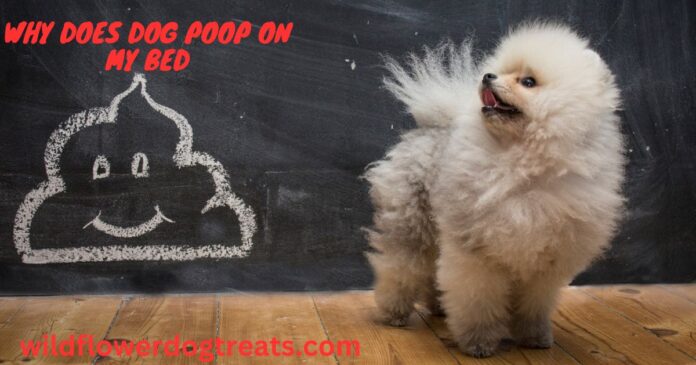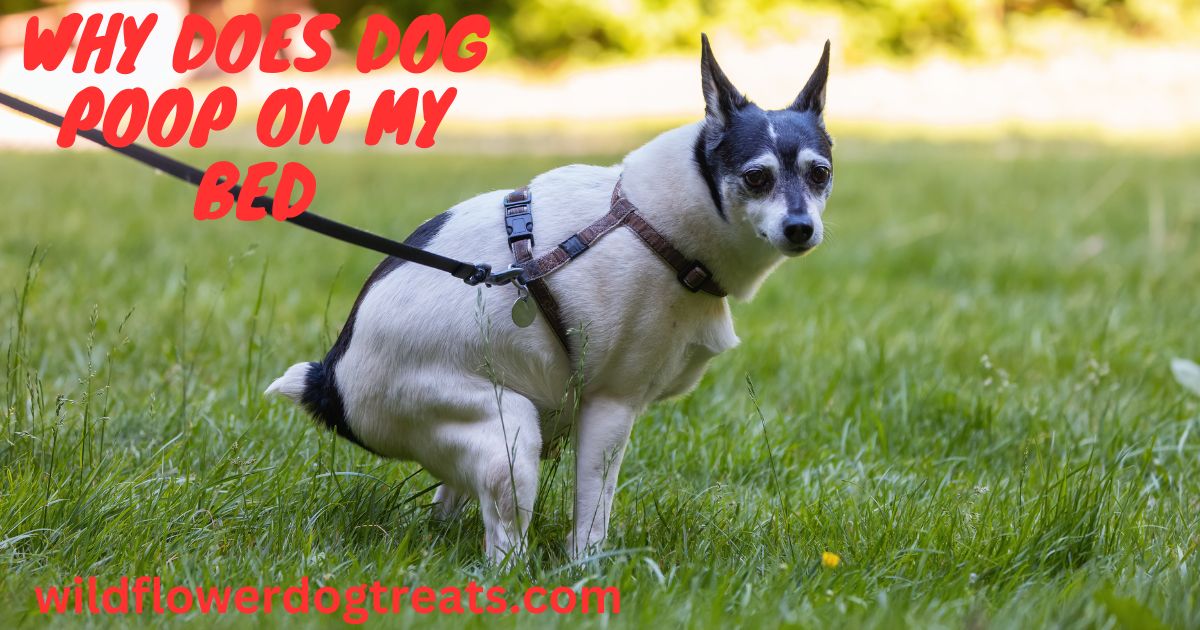Your dog may poop on your bed due to stress, illness, or needing attention. This behavior can also indicate a territorial marking or a lack of proper training.
Dog poop on your bed can be an unpleasant and confusing experience. Understanding the reasons behind this behavior can help you address and correct the issue. It is essential to consider the dog’s physical and emotional well-being, as well as their environment and training.
Discover why your dog might be pooping on your bed and learn practical solutions for prevention. Build a healthier bond with your pet by addressing the root cause effectively.
The Psychology Of A Dog’s Pooping Habits
Explore reasons for dogs pooping on beds and discover practical solutions for a harmonious living environment with your furry companion.
How A Dog’s Instincts Can Influence Their Choice Of Where To Poop
Understand the psychology behind a dog’s pooping habits, revealing their instinctual behaviors and how these tendencies impact where they choose to relieve themselves. Dogs, being descendants of wolves, have retained certain primal instincts, including the need to mark their territory. This territorial instinct reflects their biological urge to establish their presence and claim ownership of a particular space. Hence, when a dog poops in unexpected places like a bed, it may be motivated by an instinctual desire to assert dominance or mark their territory within the household. “`html
The Emotional Factors That May Lead A Dog To Poop On A Bed
“` Emotional factors play a significant role in a dog’s pooping habits, particularly when it comes to unexpected or undesirable locations such as a bed. Stress and anxiety can lead to inappropriate elimination as a dog may seek comfort and solace in a familiar and comforting location, such as a bed, during distressing times. Additionally, medical issues, such as gastrointestinal discomfort or digestive disorders, can also prompt a dog to seek out a soft and inviting surface like a bed to relieve themselves. “`html
The Role Of Territorial Marking In Dog Behavior
“` Territorial marking is a pivotal aspect of canine behavior and plays a key role in a dog’s pooping habits. Through scent marking, dogs communicate vital information to other animals within their environment, such as asserting dominance, establishing territory boundaries, or attracting potential mates. When a dog poops on a bed, it may be a manifestation of their instinctual drive to establish ownership of the space or communicate their presence within the household to other pets or animals. Understanding the innate need for territorial marking provides insight into a dog’s decision-making process when it comes to choosing a location for elimination. “`html “`
Medical Reasons For Dogs Pooping On Beds
When your furry friend makes an unexpected deposit on your bed, it can be frustrating and worrisome. While behavior issues can be a common reason for this unwanted behavior, it’s important to consider potential medical reasons that may be causing your dog to poop on the bed. Understanding the medical factors that can contribute to this behavior is essential in addressing the issue effectively.
The Potential Health Issues That May Cause A Dog To Have Accidents On The Bed
There are several health issues that can lead a dog to have accidents on the bed, including gastrointestinal problems, urinary tract infections, and incontinence. Gastrointestinal issues such as inflammatory bowel disease or parasites can cause discomfort and urgency in dogs, leading to accidents in inappropriate places like the bed.
Urinary tract infections can also contribute to accidents, as they can cause a dog to have difficulty controlling their bladder. Incontinence, particularly in older dogs, is another potential health issue that can result in accidents on the bed.
How Dietary Factors Can Contribute To A Dog’s Poop Behavior
Dietary factors play a crucial role in a dog’s digestive health and can significantly affect their poop behavior. An improper diet, such as feeding table scraps or low-quality commercial food, can lead to gastrointestinal upset and irregular bowel movements, potentially resulting in accidents on the bed. Additionally, sudden changes in diet or the consumption of inappropriate food items can also trigger digestive issues and affect a dog’s toileting habits.
The Relationship Between Anxiety And Digestive Problems In Dogs
There is a strong connection between anxiety and digestive problems in dogs. Just like humans, dogs can experience stress and anxiety, which can have a profound impact on their digestive system. Chronic stressors, separation anxiety, or environmental changes can lead to gastrointestinal upset, causing dogs to exhibit inappropriate elimination behaviors, such as pooping on the bed.
Environmental Factors That Influence A Dog’s Pooping Habits
Understanding why your dog poops on your bed can be a frustrating experience for any pet owner. Several environmental factors can influence a dog’s bathroom habits, causing them to exhibit unusual behavior such as eliminating on your bed. By exploring these factors, we can gain insights into why our furry friends sometimes behave this way.
How Changes In The Household Environment Can Affect A Dog’s Bathroom Habits
When it comes to changes in the household environment, dogs can be quite sensitive. Any alterations to their routine or surroundings can disrupt their bathroom habits. Dogs thrive on routine and familiarity, so even minor changes such as rearranging furniture, bringing in new furniture, or moving to a new home can disrupt their elimination routine.
Additionally, the introduction of a new family member, whether it’s a baby, a new pet, or a new roommate, can also impact their behavior. It’s essential to provide them with a safe and comfortable space where they can relieve themselves without feeling stressed or overwhelmed.
A dog’s bathroom habits can also be affected by changes in feeding schedules. If you’ve recently changed their feeding routine or adjusted their diet, it might take some time for them to adapt. Their elimination routine may change accordingly. Providing them with consistency in their feeding and bathroom routine can help them establish a predictable pattern.
The Impact Of Stress And Disruptions On A Dog’s Elimination Routine
Stress and disruptions can have a profound influence on a dog’s elimination routine. Dogs, just like humans, can experience stress and anxiety, which may manifest in their bathroom behavior. Common sources of stress for dogs include loud noises, thunderstorms, fireworks, or even separation anxiety when their owners are away.
When a dog feels stressed or anxious, they may resort to marking territory as a way to cope. Unfortunately, this can sometimes include urinating or defecating on your bed. It’s important to address the underlying stressors and provide your furry friend with a calm and secure environment to help alleviate their anxiety and prevent such incidents from occurring.
The Connection Between A Dog’s Attachment To Their Owner And Pooping Behavior
A dog’s attachment to their owner plays a significant role in their pooping behavior. Dogs thrive on social connection, and they often look to their owners for guidance and reassurance. Addressing emotional needs is key to preventing dogs from pooping on beds. Regular exercise, playtime, and affectionate interactions build a strong bond, reducing feelings of insecurity or the need for attention-seeking behavior.
Understanding the Behavior
Dogs may exhibit inappropriate bathroom behavior, such as pooping on beds, due to various reasons. It’s essential to understand the root cause of this behavior before implementing training and prevention strategies.
Subheading 2: Common Reasons Behind Dogs Pooping On Beds
Explore the common triggers that lead dogs to choose beds as a spot for elimination. Factors like anxiety, medical issues, or a lack of proper training can contribute to this behavior. Identifying these reasons is crucial for effective prevention.
Subheading 3: Addressing Medical Concerns
One of the first steps in preventing dogs from pooping on beds is ruling out any underlying medical issues. Consult with a veterinarian to ensure your furry friend is in good health. Medical problems can contribute to inappropriate elimination, and treating them is essential for behavioral improvement.
Subheading 4: Creating a Consistent Routine
Establishing a consistent routine for your dog is vital for preventing unwanted behaviors. This includes regular feeding times, bathroom breaks, and exercise. Predictability helps reduce stress and anxiety, contributing to better bathroom habits.
Subheading 5: Positive Reinforcement Training
Implement positive reinforcement techniques to reinforce proper bathroom behavior. When your dog eliminates in the designated area, provide praise, treats, or affection. Positive associations encourage dogs to repeat desirable actions.
Subheading 6: Using Crate Training Effectively
Crate training can be a valuable tool for preventing dogs from pooping on beds. Dogs generally avoid soiling their living space, making a crate a safe and controlled environment. Introduce crate training gradually to ensure your dog views it as a positive space.
Subheading 7: Supervision and Correction
Supervise your dog closely, especially during periods when they may be prone to bathroom accidents. If you catch your dog in the act of pooping on the bed, interrupt the behavior calmly and guide them to the appropriate elimination area.
Subheading 8: Consistency Is Key
Consistency is paramount in dog training. Be patient and persistent in implementing these strategies. Consistent reinforcement and positive interactions will contribute to long-term success in preventing dogs from pooping on beds.
Remember, every dog is unique, and tailoring these strategies to your pet’s specific needs is essential for effective training and prevention.
Training and Prevention Strategies for Dogs Pooping on Beds
Effective methods for house-training a dog to avoid accidents on the bed:
Dogs are creatures of habit, and with consistent training, you can successfully teach them appropriate elimination habits. Here are some effective methods for house-training your furry friend:
- Create a designated elimination area: Designate a specific spot in your yard where your dog can relieve themselves. Take them to this spot consistently, especially after meals or naps.
- Establish a routine: Dogs thrive on routine, so set a regular schedule for feeding, exercise, and bathroom breaks. This consistency will help them understand when and where they should go to the bathroom.
- Use positive reinforcement: When your dog eliminates in the appropriate area, praise them enthusiastically and offer them a small treat. This positive reinforcement will reinforce the desired behavior and motivate them to continue doing so.
- Puppy pads or newspaper: If you’re unable to take your dog outside frequently, consider using puppy pads or newspaper as temporary indoor elimination spots. Gradually move these pads closer to the designated outdoor area to encourage your dog to transition to going outside.
The importance of consistency and positive reinforcement in training:
Consistency is key when it comes to training a dog to avoid accidents on the bed. Dogs thrive on routine, and without clear signals and reinforcement, they may become confused about where it is acceptable to relieve themselves. Here’s why consistency and positive reinforcement are essential:
- Clear communication: By consistently taking your dog to the designated elimination area and praising them when they go in the right place, you’re providing clear and consistent communication. Dogs are quick learners and will soon understand what is expected of them.
- Motivation to repeat desired behavior: Positive reinforcement, such as treats and praise, motivates dogs to repeat the behavior that earned them the reward. This reinforces their understanding that going to the bathroom outside is the desired behavior.
- Building trust and bonding: Consistently training your dog and rewarding them for proper elimination habits builds trust between you and your furry friend. It also strengthens the bond you share, enhancing your overall relationship.
Tips for preventing dogs from pooping on beds and promoting appropriate elimination habits:
While accidents can happen, taking preventive measures can help ensure your dog doesn’t mistake your bed for an appropriate bathroom spot. Here are some helpful tips:
- Keep bedroom doors closed: If your dog has access to your bedroom, close the door to prevent them from entering and potentially using your bed as a toilet.
- Proper crate training: Utilize crate training to teach your dog to view their crate as a safe and comfortable space. Dogs have a natural instinct to keep their living area clean, so providing them with a crate can encourage them to hold their bladder and bowels until they’re taken outside for elimination.
- Supervise and manage access: If your dog hasn’t been fully house-trained yet, it’s crucial to supervise them closely and limit their access to areas of the house where accidents can occur, including bedrooms.
- Regular exercise: Keeping your dog physically active can help regulate their bowel movements and reduce the likelihood of accidents. Be sure to incorporate regular exercise sessions into their daily routine.
- Address underlying medical issues: If your dog continues to have accidents on the bed despite proper training and prevention strategies, consult with a veterinarian to rule out any underlying medical conditions that may be causing this behavior.
Seeking Professional Help For Dogs With Poop-related Issues
Dealing with a dog that poops on your bed can be a frustrating and unpleasant experience. While there are steps you can take to prevent this behavior, sometimes professional help is necessary to address the underlying causes. In this section, we will discuss when to consult a veterinarian or animal behaviorist, potential treatments and strategies recommended by professionals, and the benefits of seeking their assistance.
When To Consult A Veterinarian Or Animal Behaviorist For Assistance
If your dog consistently poops on your bed despite your efforts to prevent it, it may be time to seek professional help. Consulting a veterinarian or animal behaviorist can be beneficial in several situations:
- When the behavior is accompanied by other concerning symptoms or changes in your dog’s health
- If the behavior is sudden and uncharacteristic of your dog’s normal behavior
- When other training methods and interventions have been ineffective
- If you suspect there may be an underlying medical condition causing the behavior
Potential Treatments And Strategies Recommended By Professionals
When you consult a veterinarian or animal behaviorist, they will conduct a thorough evaluation of your dog’s physical and behavioral health. Based on their assessment, they may recommend various treatments and strategies to address the poop-related issues. Some potential interventions could include:
- Medical tests to rule out any underlying health conditions
- Dietary changes to address digestive issues or food sensitivities
- Behavior modification techniques to redirect the dog’s elimination behavior
- Environmental modifications to prevent access to certain areas or enhance potty training
- Medication or supplements to manage any physiological factors influencing the behavior
The Benefits Of Seeking Professional Help In Resolving This Issue
Engaging a professional to address your dog’s poop-related issues can provide several benefits:
- Expertise: Professionals have in-depth knowledge and experience in handling behavioral problems in dogs, allowing them to develop customized treatment plans based on your dog’s specific needs.
- Accurate Diagnosis: Veterinarians can determine if there is an underlying medical condition contributing to the behavior, ensuring it is properly addressed.
- Effective Solutions: By using evidence-based treatments and strategies, professionals can help resolve the issue efficiently, saving you time and frustration.
- Peace of Mind: Seeking professional help gives you reassurance that you are taking the necessary steps to improve your dog’s well-being and prevent further incidents.
Remember, each dog is unique, and what works for one may not work for another. Seeking professional help can provide you with the guidance and support needed to address your dog’s poop-related issues effectively.
Frequently Asked Questions On Why Does Dog Poop On My Bed
Why Does My Dog Poop On My Bed?
Dogs may poop on your bed for various reasons such as anxiety, territorial marking, or a medical issue. It is important to consult a veterinarian to rule out any health concerns. Additionally, providing proper potty training and creating a safe and comfortable space for your dog can help address this behavior.
How Can I Stop My Dog From Pooping On My Bed?
To prevent your dog from pooping on your bed, establish a consistent potty routine, supervise their behavior, and restrict access to your bedroom. Proper training, positive reinforcement, and creating a comfortable and secure environment can also help modify this behavior.
Consulting a professional dog trainer may be beneficial in addressing this issue effectively.
Is There Any Medical Reason For My Dog Pooping On My Bed?
There can be underlying medical issues that cause dogs to poop on the bed, such as gastrointestinal problems, urinary tract infections, or anal gland issues. If you notice this behavior persisting or accompanying other symptoms, it is essential to consult a veterinarian to evaluate your dog’s health and provide appropriate treatment.
What Should I Do If My Dog Has An Accident On My Bed?
If your dog has an accident on your bed, clean it immediately using a pet-safe stain and odor remover. Wash your bedding thoroughly with an enzyme-based cleaner to eliminate any residual scent. Providing your dog with proper potty training and ensuring they have regular bathroom breaks can help prevent future accidents.
Conclusion
To avoid your furry friend’s unexpected deposits on your bed, understanding the underlying reasons and taking appropriate measures is essential. Whether it’s due to an illness, anxiety, or lack of proper training, addressing these issues can help prevent future accidents.





I don’t think the title of your article matches the content lol. Just kidding, mainly because I had some doubts after reading the article.
Can you be more specific about the content of your article? After reading it, I still have some doubts. Hope you can help me.
Больше никаких отказов! [url=https://mirtinvest.ru/]mirtinvest.ru[/url] предлагает вам подборку проверенных МФО, выдающих займы онлайн без звонков и лишних проверок. Основные требования — это наличие паспорта и именной банковской карты. Мы гарантируем одобрение для 90% заявок на суммы до 30 000 рублей. Убедитесь, что получить займ может быть легко и быстро. Наш портал — это ваш надёжный путь к срочной финансовой помощи.
Займ с мгновенной выдачей на карту в [url=https://t.me/s/mfo_2024_online]МФО 2024[/url] года, без отказов и проверок.
Ищете займ без переплат? На нашем [url=https://all-credit.ru/zaym-35000-rubley/ ]сайте[/url] представлены лучшие предложения микрокредитов под 0% для новых клиентов. Это уникальная возможность получить деньги на карту, не заплатив ни рубля сверх суммы займа. Такие предложения особенно популярны среди новичков, которые впервые обращаются в МФО. На [url=https://all-credit.ru/novye-zajmy/ ]странице[/url] собраны все актуальные микрокредиты под 0%, условия их получения, а также нюансы, которые стоит учесть при оформлении. Быстрое одобрение, отсутствие процентов и возможность вернуть деньги без переплат — вот что ждет вас при выборе этих предложений. Оформите свой первый займ прямо сейчас!
Ищешь, где получить займ на карту без отказов и проверок? Тогда ты по адресу! На [url=https://mirtinvest.ru/]mirtinvest.ru[/url] собраны лучшие предложения от проверенных МФО, которые реально выдают микрозаймы каждому. Хватит переживать из-за отказов — заходи на наш сайт, выбери подходящий займ и получи деньги уже сегодня! Процесс простой, быстрый и без лишних вопросов. Финансовая помощь ближе, чем ты думаешь!
[url=https://mikro-zaim-online.ru/]новые мфо займы на карту[/url]
Тепло и уют вашему ребенку гарантированы – [url=https=https://uggs-russia.com/]купить детские угги[/url] по выгодной цене!
Не теряйте время! Оформите [url=https://all-credit/]займ без процентов на карту[/url] прямо сейчас и решите финансовые проблемы без переплат.
Если вы ищете надёжную технику, [url=https://euroshop18.ru/katalog/vinnye-shkafy/]винный шкаф встраиваемый[/url] на euroshop18.ru станет отличным выбором. Почему? Ассортимент проверенных брендов, разумные цены и удобная доставка. Вы получаете всё необходимое для комфорта на кухне!
[url=https://bycesoir.com/]Выгодные займы под 0.8%[/url]
Simply desire to say your article is as astonishing.
The clarity to your publish is just spectacular aand i
can think you’re an expert on this subject.
Well with your permission let me to take hold of yopur feed
to stay updated with imminent post. Thhanks a million and please keep up the rewarding work. https://gosta.media/
Интересует [url=https://potolki-kitstroy.ru/]перепланировка помещений стоимость[/url]? Мы предлагаем прозрачные цены и качественные услуги по проектированию и узакониванию изменений, чтобы ваш проект был согласован без проблем.
[url=https://t.me/s/new_mfo]Новые МФО с выдачей микрокредитов абсолютно всем[/url] открывают доступ к займам без проверок. Оформите за несколько минут онлайн!
[url=https://t.me/s/zaim_bez_otkazov_na_kartu]Займ на карту без отказов и проверки документов[/url] — это удобное решение для тех, кто хочет избежать длительных проверок. Получите средства быстро и без проблем.